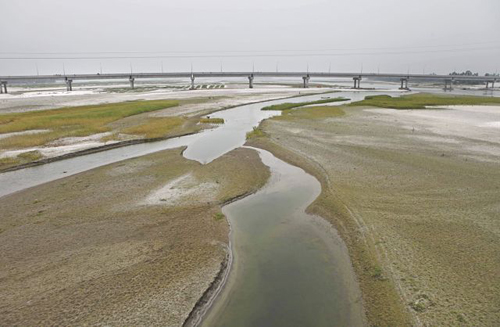Bangladesh suffers Tk 30,000 crore in loss annually because of India’s unilateral withdrawal of waters upstream, according to an estimate made by some environmentalists and river water experts in Bangladesh. Due to insufficient water flows from India, Bangladesh is facing severe losses in crop production, fishes, aquatics, intrusion of salinity and degradation of environment and forests over the years, they said. They made the observation while speaking at a roundtable on ‘Teesta Water Issue: Will it be ever resolved’ organized by an NGO, the South Asia Youth for Peace and Prosperity, at the national press club on Saturday. They urged the government to lodge complaints with the sixth committee of the United Nations and involve a third party to realize Bangladesh’s just share of Teesta water. Unanimously, they also feared that the Teesta water sharing would not be solved bilaterally with India. Former adviser to United Nations Dr SI Khan said India has built many barrages and embankments on all of the cross-border rivers and changed their courses in favour of their own interest. He urged the government of Bangladesh to respond in a proper way to settle trans-boundary water resources with India so that the nation’s interest is secured. Eminent political scientist Dilara Chowdhury said India was arbitrarily violating international rivers laws and diverting waters to enhance its food production by 2050. She said India may not launch military invasion against Bangladesh but it will continue to rob this country’s resources. Bangladesh Water Partnership president engineer Shahidul Hasan said he believes it is impossible to resolve water sharing issues with India bilaterally. Therefore, he suggested that Bangladesh includes a third party, such as the UN and China, to this end. Former WARPO director general engineer Enamul Haque also said India has been withdrawing waters from Teesta and other rivers through erecting various canals. The water shortfall in Teesta river caused various sufferings to the three crore inhabitants living on 20,000 square kilometers in Bangladesh, he said. Chairman of International Farakka Committee Professor Jasim Uddin Ahmad said the ecology of the Sunderban, the largest mangrove forest, is being damaged as salinity rises due to shrink in fresh water flows and inclusion of sulphur dioxide, flown from Indian coal-run power plants. Journalist and environmentalist Mostafa Kamal Majumder presented a keynote paper at the roundtable. Youths from Dhaka University and some other private universities and colleges took part in the lively discussion.
Source: New Age










